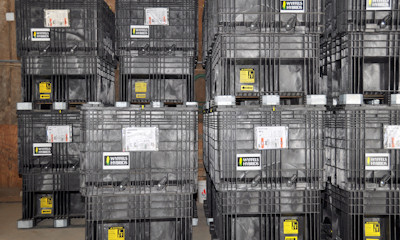
It’s a true sign that spring will be here before we know it: seed delivery season. And distribution trucks are rolling. So whether your seed is already in your shop or you haven’t taken delivery yet, there are a few things to keep in mind to protect your seed investment.
Dennis Bowman, extension educator, University of Illinois, says moisture is the biggest threat to delivered seed. “A leaky roof or flooding will ruin your day. Cool and dry are the best conditions.”
Bowman also advises keeping delivered seed in a secure environment, away from a number of intruders, “whether the pest is six, four or two legged.”

PRECIOUS CARGO: Keeping seed in top shape requires following a few simple rules.
If you are concerned about seed freezing in a non-climate controlled building, Bowman says that “cold isn’t really an issue.” Bowman explains the moisture content in seed is even lower than stored grain, making it unlikely for the seed to freeze.
As for seed left from the 2015 growing season, Bowman recommends a germ test. Here in Illinois, farmers can send seed to the Illinois Crop Improvement Association lab for germination testing. “They can do a warm test and a variety of other tests that will measure germination under stressful conditions,” Bowman says.
Another option for farmers is an “at home” warm test. All it takes are some damp paper towels and a flat pan.
“Place 100 seeds in a 10 x 10 grid on a doubled section of paper towel. Cover with another layer of paper towels, moisten and roll up. Keep in a warm place and check in three to five days. The seed count will give you a germination percentage.” For example, if 83 seeds germinate, your percentage is 83%.
For more information on the Illinois Crop Improvement Association germination testing, visit ilcrop.com.
About the Author(s)
You May Also Like




